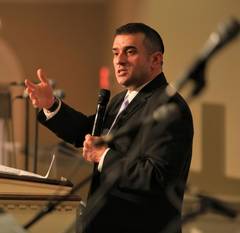- About Us
- Learning
- Resources
- Get Involved
- Membership
- Jobs
The Face Has Already Been Revealed
06/08/2022 04:09:02 PM
Rabbi Brent Spodek
| Author | |
| Date Added | |
| Automatically create summary | |
| Summary |
Many people who live a "religious life," or aspire to one, pray that God will appear to them in a cacophonous moment of revelation. Every morning in many synagogues, particularly in Israel, Jews hope for a glimpse of the divine presence when they dramatically reenact the Priestly Blessing from Parashat Naso:
May the LORD bless you, and keep you:
May the LORD make His face shine upon you, and be gracious unto you:
May the LORD lift up His face towards you, and give you peace.
What is it we hunger for when we pray to see the face of God?
Perhaps we pray for a moment of God's unending love which will ameliorate all of the pain and suffering inherent in human life. God will appear as a gentle glow, in whose light we can bask and be okay.
Or perhaps we hope to know God as intimately as we know a friend, or even to believe that such intimacy is possible. For what is a face, really? More than an amalgam of features, it is the vehicle of interaction, the vessel through which we connect to other people. If God were to turn the Divine Face towards us, then suddenly God, who so often feels distant or even nonexistent, would be as immanent as a lover.
 Alternately, perhaps when we pray to see the face of God, we hope for the certain knowledge that would follow if God lifted His face towards us. Suddenly, we would know that God is real just as Abraham, that knight of faith, knew. We would know that God is real in the way that Moses, who spoke to God face to face, knew. We would see the face of God and then revelation and faith would cease being mysteries, and become concrete realities in our lives.
Alternately, perhaps when we pray to see the face of God, we hope for the certain knowledge that would follow if God lifted His face towards us. Suddenly, we would know that God is real just as Abraham, that knight of faith, knew. We would know that God is real in the way that Moses, who spoke to God face to face, knew. We would see the face of God and then revelation and faith would cease being mysteries, and become concrete realities in our lives.
But perhaps the chronology – God decides to reveal the Divine Face and then we experience revelation – is backwards. Perhaps “revelation” doesn’t describe the moment after God decides to reveal His face as a supernal visage, filling the sky with thunder and lightning. Perhaps God’s Face is lurking in potential in the face of every human being and revelation is the moment when we recognize that the flesh and bone faces we see walking down the street contain a trace of the divine.
As the Jewish philosopher Emanuel Levinas put it, the dimension of the divine opens forth from the human face.
We pray to see God’s Face, but perhaps the Face has already been revealed, set atop every human body, and we would be better served to pray for the ability to see It. We are hoping for a revelation with trumpets, a revelation to which we can proudly stand up and declare our presence, as Abraham did when God called to him. We spend tremendous time enmeshed in our painful hopes for something transcendent, something extra-ordinary, when it might be that the only possible revelation of the divine is sitting across from us on the cross-town bus, waiting for us to notice.
But perhaps like those early morning Jews, who cover their heads with their prayer shawls, fearful of the force of God’s blessing, we too are hesitant to encounter the immanence of God. We are hesitant because we know that nobody can see the face of God and live, at least not as they have. When we recognize the face of another human being as the face of God, we encounter something outside of ourselves which disrupts our own self-obsession. Could Moses have possibly heard the call of God from the burning bush and said “Thanks for calling, but I’m doing something more important now. I look forward to getting back to you as soon as possible”? Divinity demands a response, no less when it appears on a person than when it appears on a bush.
When we recognize that face on the bus as the face of god, we cannot go on living as we have. As Elizabeth Barrett Browning wrote,
The Earth's crammed with heaven,
And every common bush afire with God;
But only he who sees takes off his shoes
The rest sit round it and pluck blackberries
And daub their natural faces unaware.
One cannot see the face of God and continue with business as usual anymore than one can hear a lion roar and not be afraid. When we perceive God’s face in nature, perhaps the response is to fall on our faces. When we perceive God in the pages of a book, then perhaps the response should be with words. But when the face of God appears in the faces of humanity, then our response is in the syntax of ethics.
Thu, December 4 2025
14 Kislev 5786
RABBI BRENT SPODEK

Join Our Mailing List
Privacy Settings | Privacy Policy | Member Terms
©2025 All rights reserved. Find out more about ShulCloud


